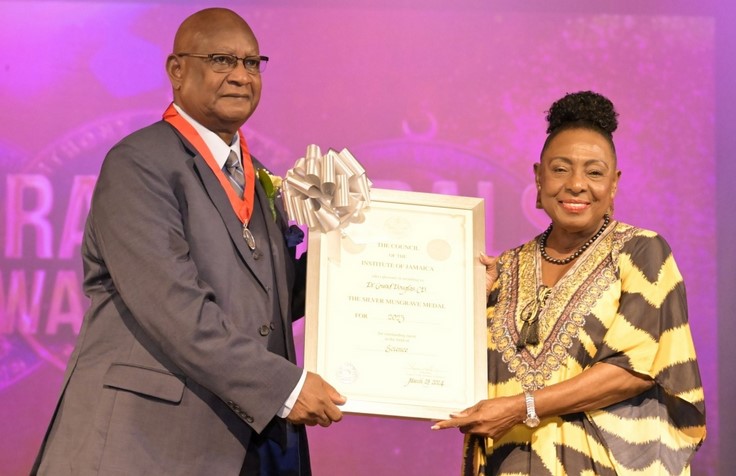
KINGSTON –Jamaican scientist Dr. Conrad Douglas is the recipient of the Silver Musgrave Medal in Science for his work in the area of science and technology and innovation in industry and the environment.
He received the award during a ceremony hosted recently by the Institute of Jamaica (IOJ) at the Philip Sherlock Centre for the Creative Arts.
“I am happy with the award. It’s good to be appreciated, even though one didn’t start with that in mind,” Dr. Douglas told JIS News.
According to the IOJ, Dr. Douglas, has made significant contributions to the field of science through his extensive career and diverse range of activities. He has also been a pioneering figure in applied science, particularly in industries such as bauxite-alumina production.
To this end, Dr. Douglas was instrumental in re-engineering the preservation of the Jamaica-Ukraine alumina deal, thus continuing the inflow of precious foreign exchange to the tune of US$35 million per annum.
“The Jamaican bauxite is fine-grained (powdery) in texture and not like small round marbles (such as Australian bauxite) nor massive rocks (like Guinea bauxite) and the Ukrainian facility had a difficulty processing it. A lot was being lost to the environment and caused an air-pollution problem, which had to be solved. I devised a way of making the bauxite thicker just to suit the Ukrainian system,” he explained.
Former Bauxite company, Alcan Jamaica Ltd also benefited from his expertise.
Dr. Douglas is also focused on building a talent pool in science through the provision of scholarships for his staff and other persons at the tertiary level, as well as internships and co-supervision of PhD students.
“So far, two students have done their doctoral degrees involving my co-supervision. I believe in giving back,” he stated.
Dr. Douglas also gives sacrificially, through his more than 38-year-old pioneering science and technology-based companies, Conrad Douglas & Associates Limited and Environmental Science & Technology Limited (CDA-ESTECH), contributing more than US$50,000 to scholarship programmes, while donating several laptops during the COVID-19 pandemic.
Science books were also donated to the primary, secondary and tertiary education systems throughout Jamaica, in support of STEM (science, technology, engineering and mathematics).
“I want to ensure that needy students have a launch pad to get into the field of science and keep the momentum going. I would not be where I am today if it were not for the thoughtfulness, kindness and foresight of others who provided opportunities for me. Hence it is only natural to assist,” Dr. Douglas said.
Outside of Jamaica, Dr. Douglas has worked for seven United Nations agencies and other multilateral organisations such as the Organization of American States (OAS), the Commonwealth Secretariat, the World Bank and the Inter-American Development Bank (IDB).
He has also worked at various bilateral agencies such as the United States Agency for International Development (USAID) and the Centre for Development of Enterprise (CDE).
“I did a stint as an Environmental and Industrial Science Consultant with the United Nations Environment Programme (UNEP) Industry and Environment Office in Paris, France, from 1979 to 1983 and developed four major publications, which were translated into French and Russian and sold throughout the world,” Dr. Douglas stated.
“I had the opportunity to advise on the world’s bauxite and alumina industry, including advising on the peculiarities of the Jamaican bauxite industry. I also served as a Project Manager for the United Nations Industrial and Development Organization (UNIDO), Vienna, Austria, for upgrading the scientific and technological capabilities of the Jamaica Bauxite Institute. I also reported to the United Nations Development Programme (UNDP) and the UN Financing System for Science and Technology for Development (UNFSTD),” he added.
In more recent times, Dr. Douglas has been a consultant to the UNDP and United Nations Educational, Scientific and Cultural Organization (UNESCO).
Moreover, he has carried out work in more than 45 countries in Asia, Africa, Europe, North, Central and South America and the Caribbean.
Meanwhile, Dr. Douglas said he was always fascinated by the creatures around him from childhood.
“I would study the ants for hours [and] see how they organise their world. Observation is the first principle of science; from there, you analyse problems and put forward solutions, then evaluate the outcome. That is one way to make the world a better place,” he reasoned.
Dr. Douglas attributes this innate passion for discovery to his father and a nurturing home.
“I am from a science-oriented family. Both my dad and mom excelled in science at the Jamaica Local Examinations (Third Year and Second Year) for which they both obtained distinctions or capital letters, respectively. My dad purchased three sets of Encyclopaedias for me; among them was American People’s Encyclopaedia. I read all the books and followed through with the references. When I attended class, what the teacher would sometimes be teaching was what I read the day before. Hence it was like revision,” he revealed.
His progress in science increased when he received a University of the West Indies postgraduate scholarship and a demonstratorship for doing postgraduate studies.
Alcan also sponsored his PhD research on unaccountable caustic soda losses in alumina production, to the tune of US$7,000 per annum.
“I suppose you would consider that a major worthwhile investment in light of the savings that led to the optimisation of the bauxite processing. Those studies whetted my appetite and enabled me to add new material to the pool of knowledge,” Dr. Douglas pointed out.
He added that he is currently working on climate proofing, which, he said, is a partial answer to climate change.
“People are suffering and even dying from the high temperatures across the globe. Some of my staff members and I are currently doing research that has the potential to make a significant contribution to climate change adaptation and possibly mitigation. This has great implications for Jamaica and the world at a time when islands are disappearing due to rising sea levels,” he stated.

